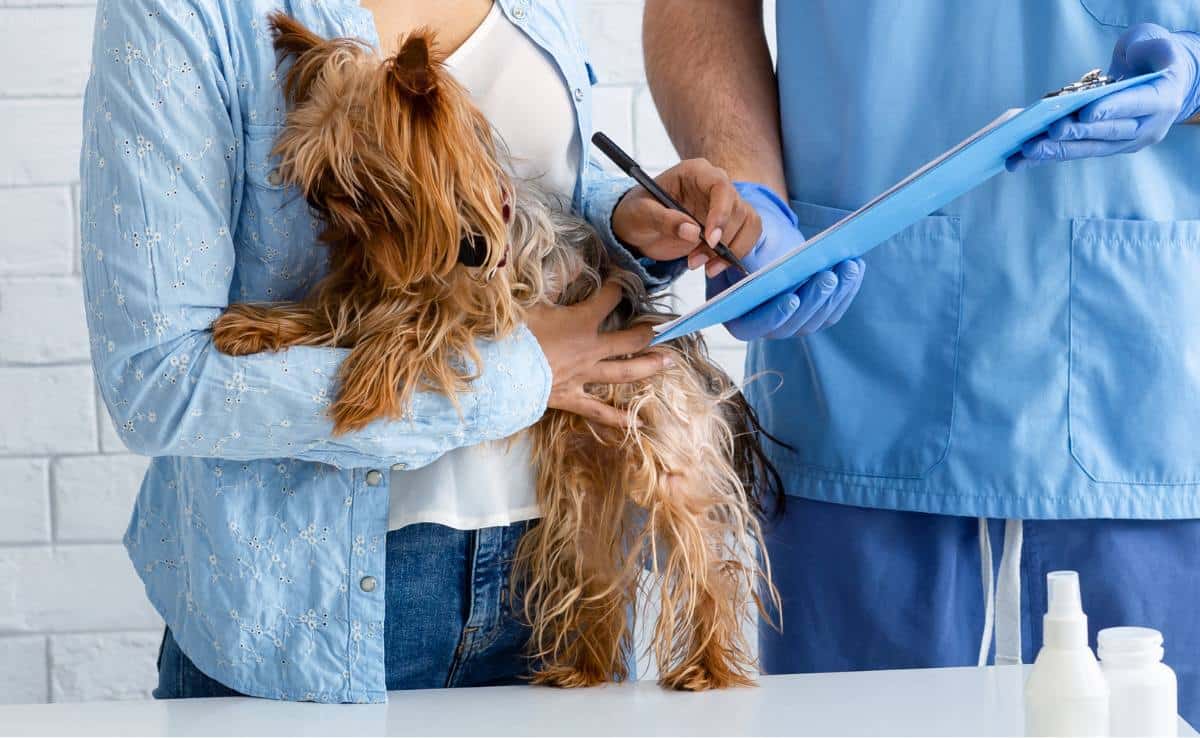Does Pet Insurance Cover Cryptorchidism In Dogs?
When you purchase through links on our site, we may earn a commission. Here’s how it works.

Cryptorchidism can cause confusion for pet parents wanting to know if insurance will cover it. This is because the treatment for cryptorchidism is neutering your dog, which on its own isn’t covered by pet insurance. However, the necessity for neutering your dog due to a cryptorchidism diagnosis may make the castration surgery and related diagnostics eligible for coverage through pet insurance. Clear as mud? We’ll provide more details about the condition and different scenarios that may make pet insurance coverage a possibility.
Table of Contents
What Is Cryptorchidism In Dogs?
Cryptorchidism is a condition in which one or both of a dog’s testicles don’t drop to the scrotum. It’s also known as an undescended testicle or retained testicle in dogs.
Male dogs with cryptorchidism have an increased risk of testicular cancer and infertility. Dogs diagnosed with cryptorchidism should be neutered to prevent health risks and to prevent passing the condition down their bloodline.
Does Pet Insurance Cover Cryptorchidism?
Yes, pet insurance covers surgery like cryptorchidism as long as no signs or symptoms appear until after enrollment and waiting periods. Cryptorchidism is most commonly diagnosed around six months old.
Keep in mind that any accidents or illnesses that present symptoms during the waiting period will also be exempt from coverage by most insurers. The average pet insurance waiting period for illnesses is 14 days (some are up to 30 days). You should enroll your dog in pet insurance by at least four months old to increase your chances of having pet insurance coverage for the possibility of cryptorchidism. However, the sooner the enrollment, the better, and most pet insurance companies begin enrollment around six to eight weeks old.
How Much Is Surgery For Cryptorchidism In Dogs?
Georgie, a King Charles Cavalier Spaniel, was diagnosed with cryptorchidism at six months old. His parents scheduled neutering surgery for him shortly after. The total vet bills for neutering increased by $349 because there are additional diagnostics and precautions taken for male dogs with cryptorchidism. In total, Georgie’s surgery for cryptorchidism cost $1,229.
What If I Don’t Want To Neuter My Dog?
Neutering males with cryptorchidism is strongly advised. Twisting of the testes (or testicular torsion) may occur and cause pain, necessitating a veterinarian to perform emergency surgery to correct if left untreated. It’s unethical to breed dogs with cryptorchids. Since cryptorchidism is an inherited condition, it’s critical to eradicate the faulty gene from the lineage.
It is estimated that dogs with cryptorchidism have a tenfold increased risk of developing testicular cancer compared to normal dogs. Neutering your cryptorchid dog can help him dog live his healthiest life.
Choose The Best Pet Insurance
Pet insurance covers many conditions besides cryptorchidism. Because cryptorchidism coverage is fairly standard in pet insurance, you don’t need to choose your pet insurance provider solely based on this. However, you should consider several other factors, including overall policy coverage, customer service and reputation, claim processing average, pricing, plan customizations, and more. We go into great detail on these categories and rank the best pet insurance companies to help you make the most informed decision and give you peace of mind.
Methodology: How We Rank The Best Pet Insurance Companies
My team and I conduct extensive research on the most reputable pet insurance companies, analyzing customer feedback, policy changes, and industry trends. Our licensed insurance agent fact-checks everything, and we update our reviews year-round as insurers adjust premiums, coverage, exclusions, and customer service.
We rank each U.S. pet insurance provider using a 100-point scale, ensuring an unbiased breakdown of how companies perform in real-world claims.
Our Ranking Criteria
- Coverage & Exclusions (30%) – We analyze policies, exclusions, and age restrictions, rewarding companies with fewer coverage limitations.
- Pricing (15%) – We run thousands of sample quotes and factor in extra fees, discounts, and add-ons.
- Customer Service & Reputation (12%) – We review hundreds of customer experiences, assess the sign-up process, and evaluate claim support.
- Financial Strength (10%) – We examine A.M. Best & Demotech ratings to ensure companies can pay claims reliably.
- Customization Options (10%) – Providers with more deductible, reimbursement, and payout flexibility rank higher.
- Waiting Periods (5%) – Shorter illness & accident waiting periods result in a better score.
- Claim Processing (5%) – Companies offering fast reimbursements and direct vet pay score higher.
- Innovation (3%) – We recognize unique offerings and advanced technology in the industry.
Unbiased Pet Insurance Rankings: Putting Pets First
Unlike many review sites, we don’t sell rankings—every provider earns its spot based on real performance. Our in-depth comparisons help pet parents make informed decisions, while insurers use our reviews to improve their policies. We only recommend the best because that’s what our readers deserve.
Why Trust Canine Journal?
Before other media outlets realized how popular pet health care was becoming, Canine Journal has covered pet insurance for over 12 years. Many of our writers possess firsthand knowledge of pet insurance, such as Kimberly Alt, who has been Canine Journal’s reliable pet insurance writer for more than ten years, covering almost every aspect of pet insurance. To help her respond quickly to a wide range of pet insurance inquiries, Kimberly carefully reviews every word in every pet insurance policy. And thanks to her vast list of resources, in the rare instance that she cannot find the answer immediately, she can locate it in a matter of minutes.



